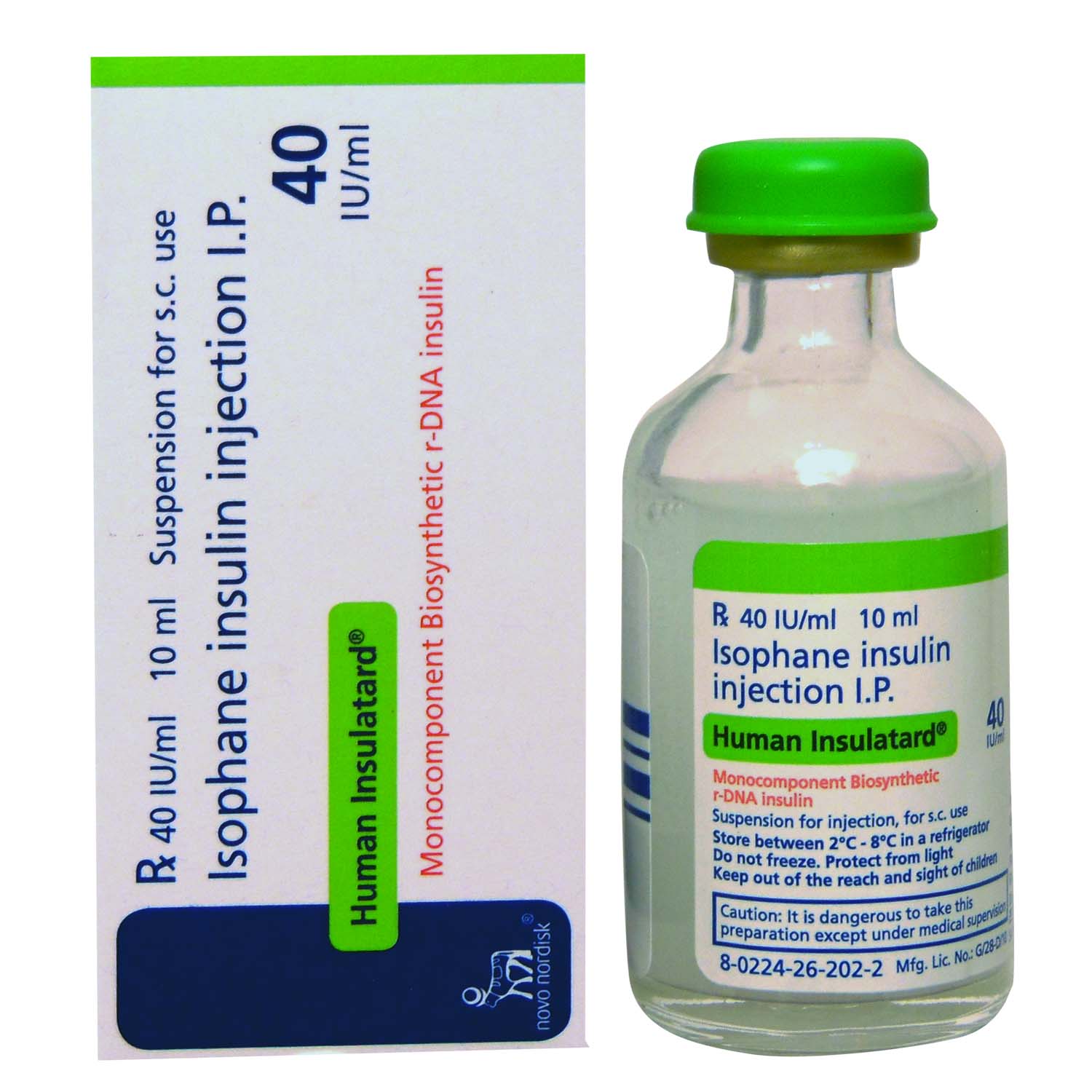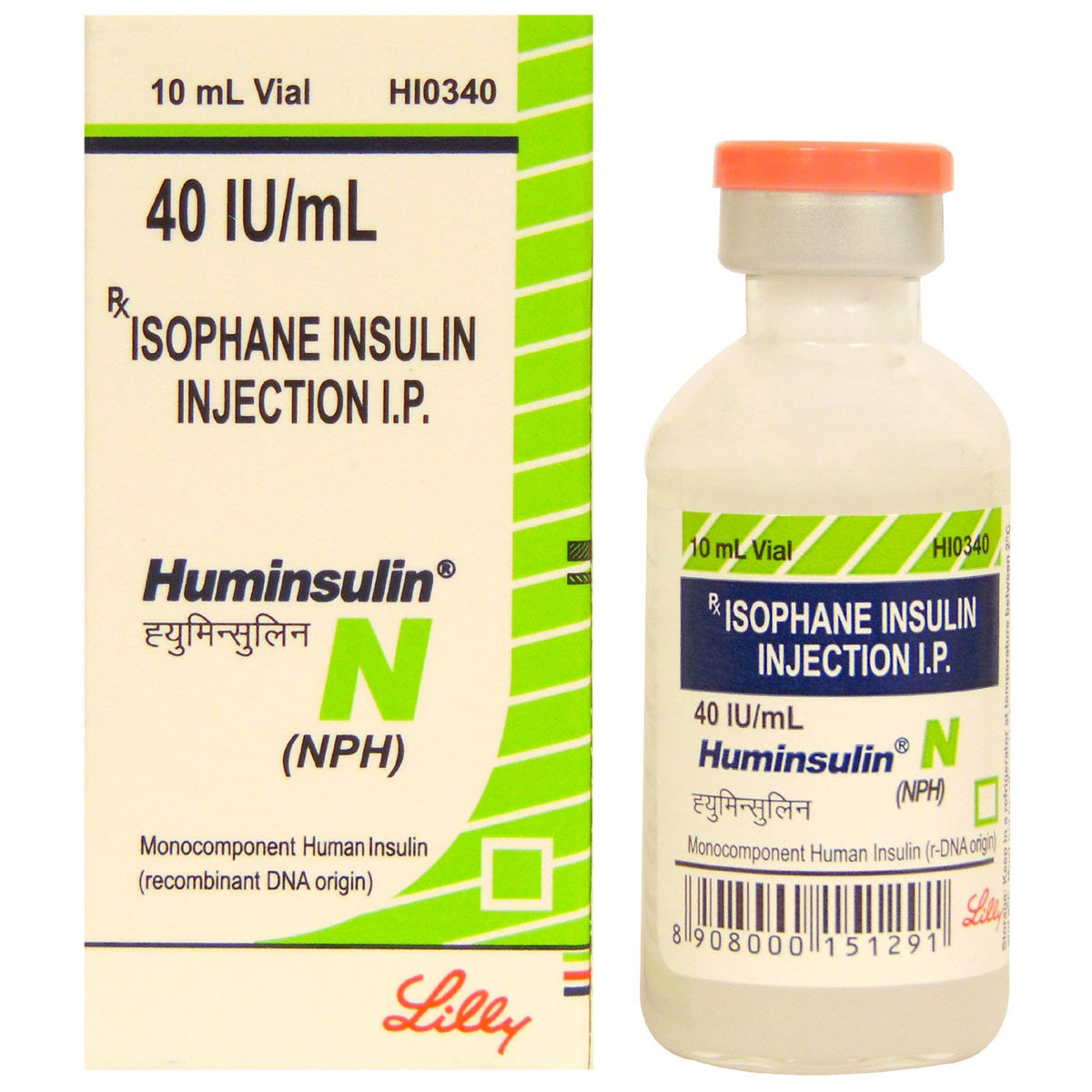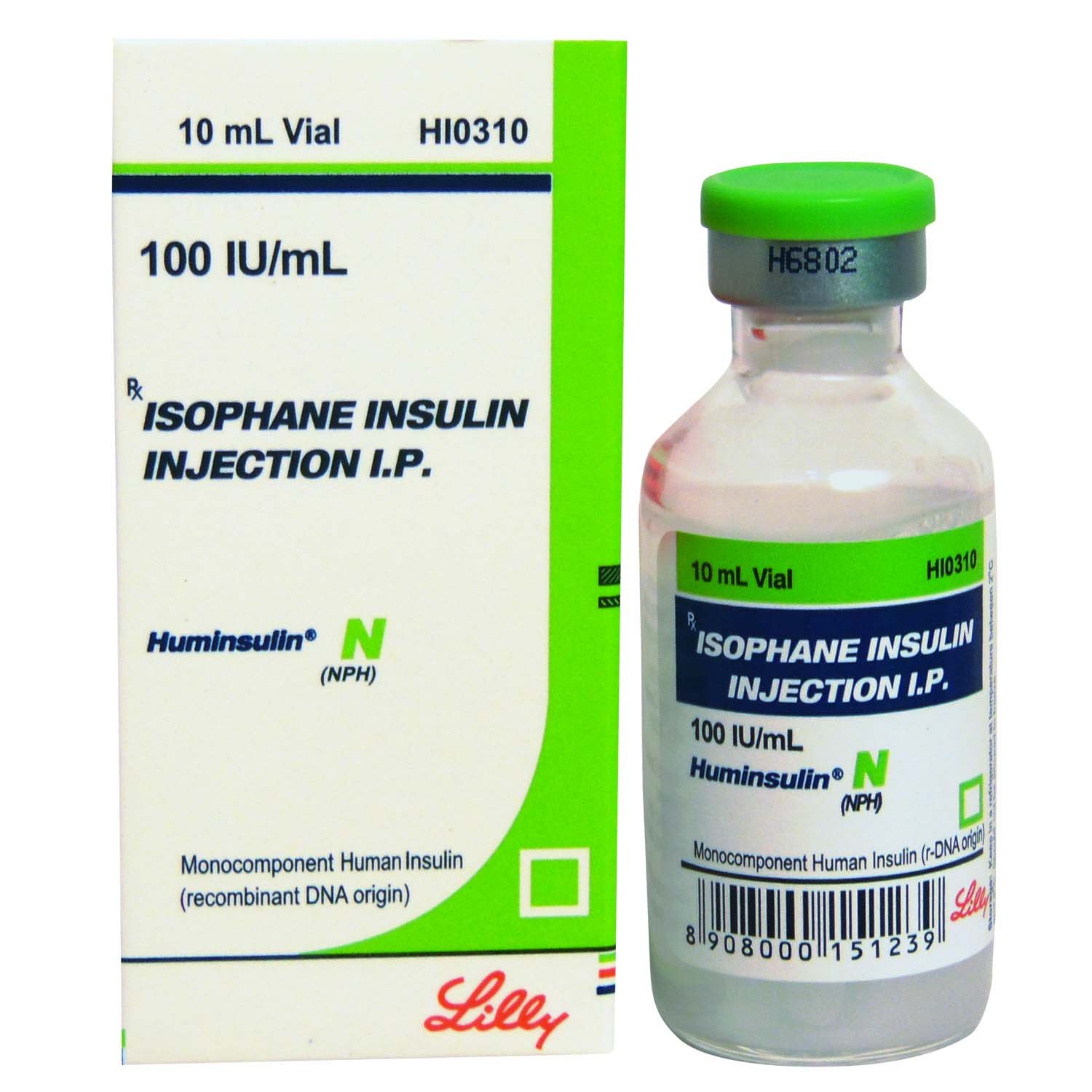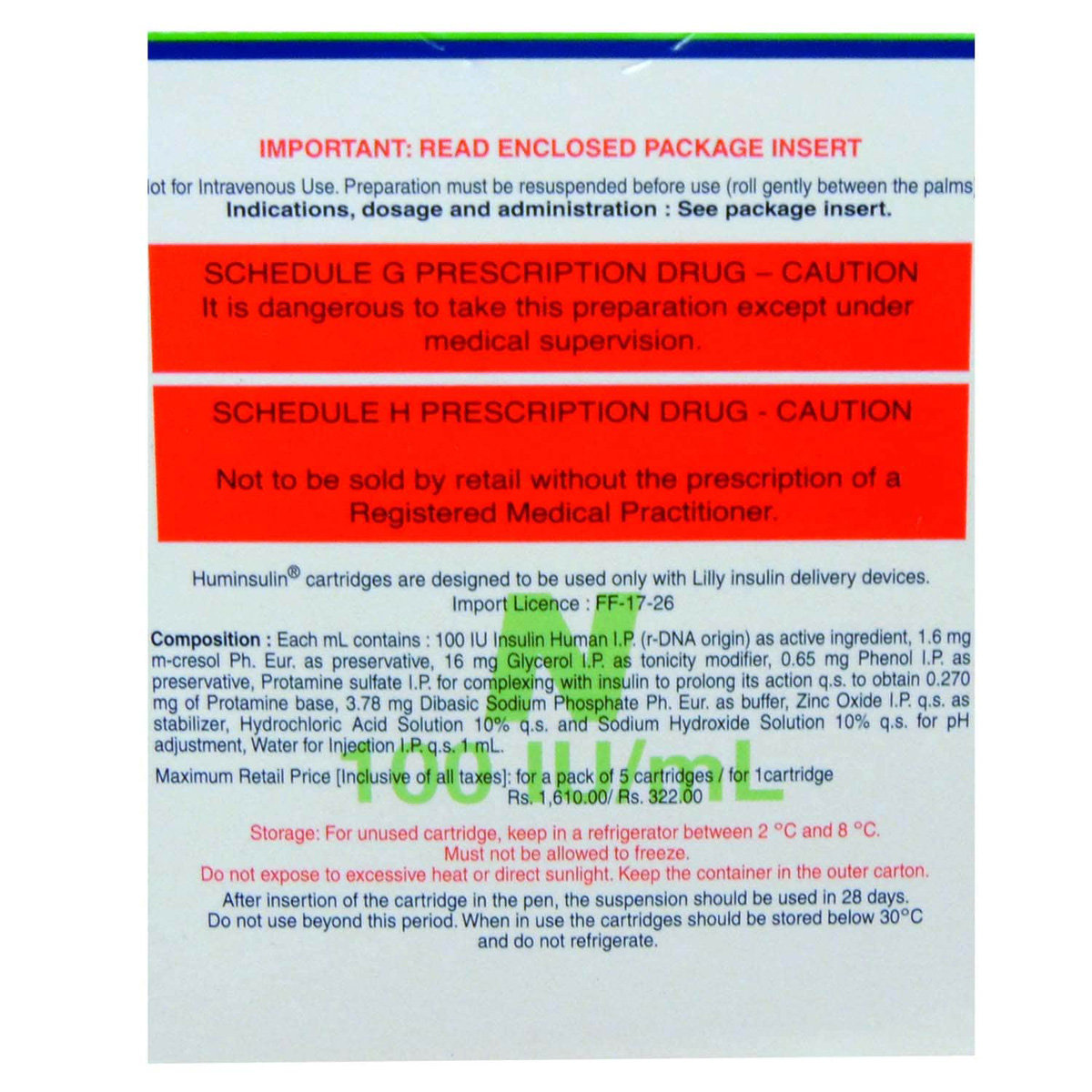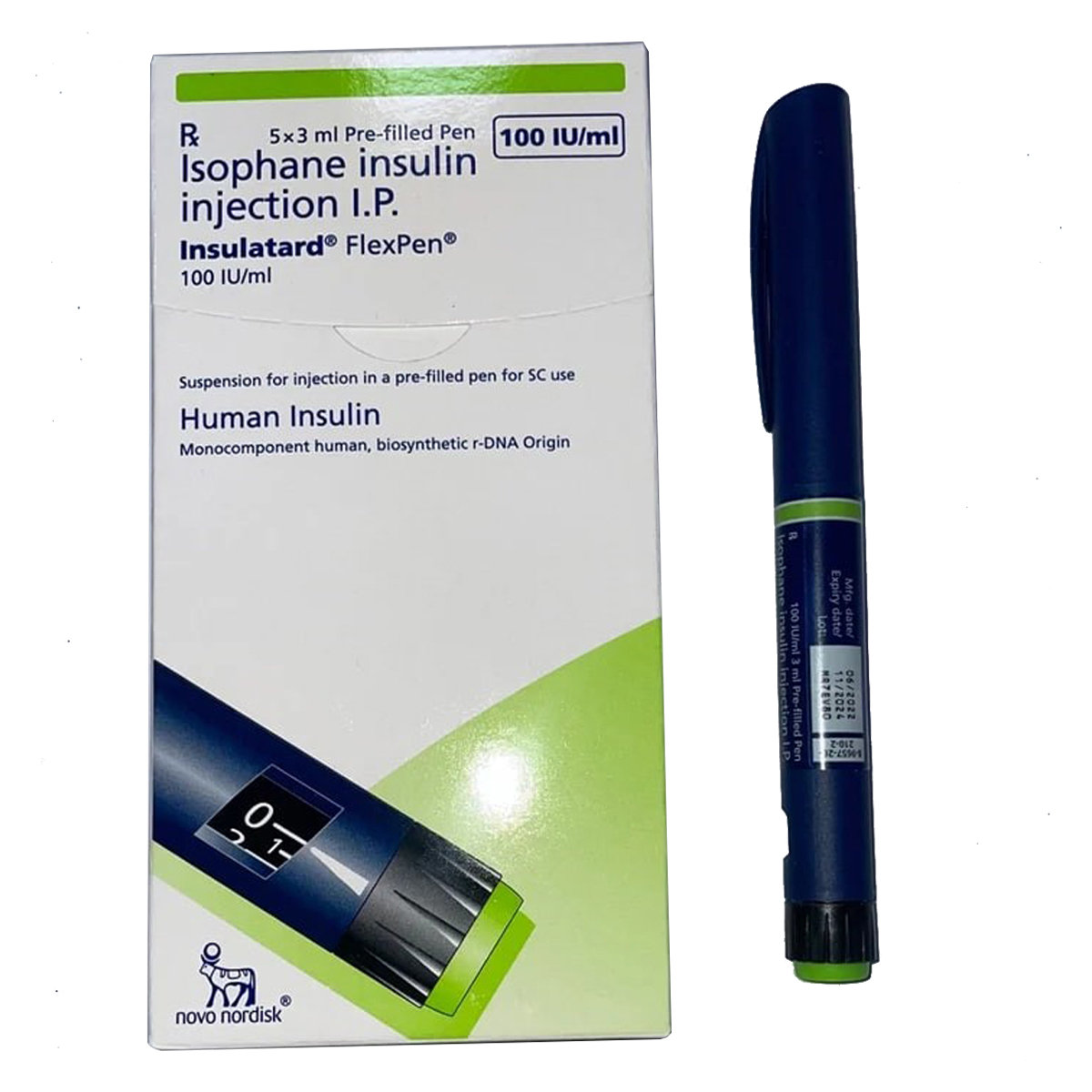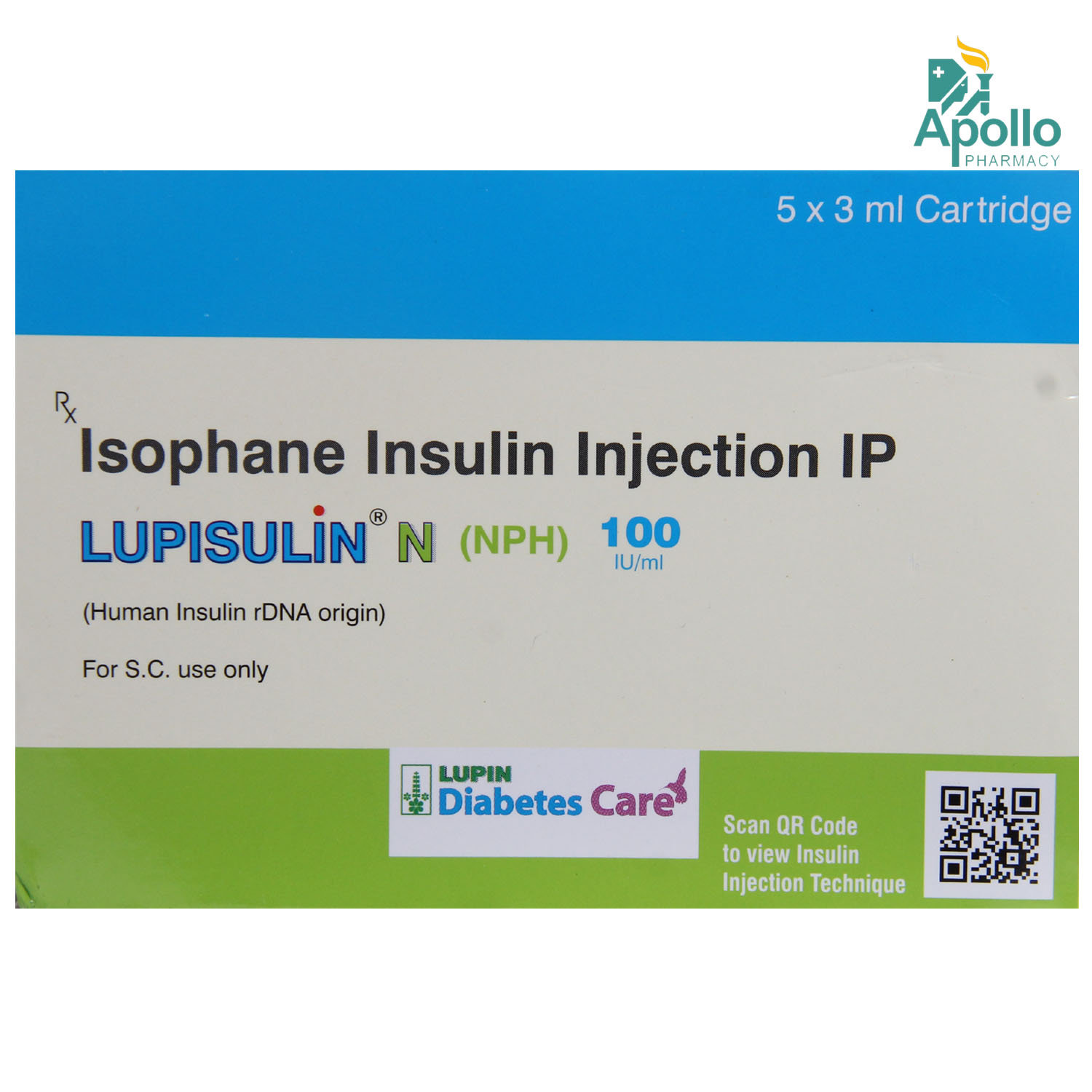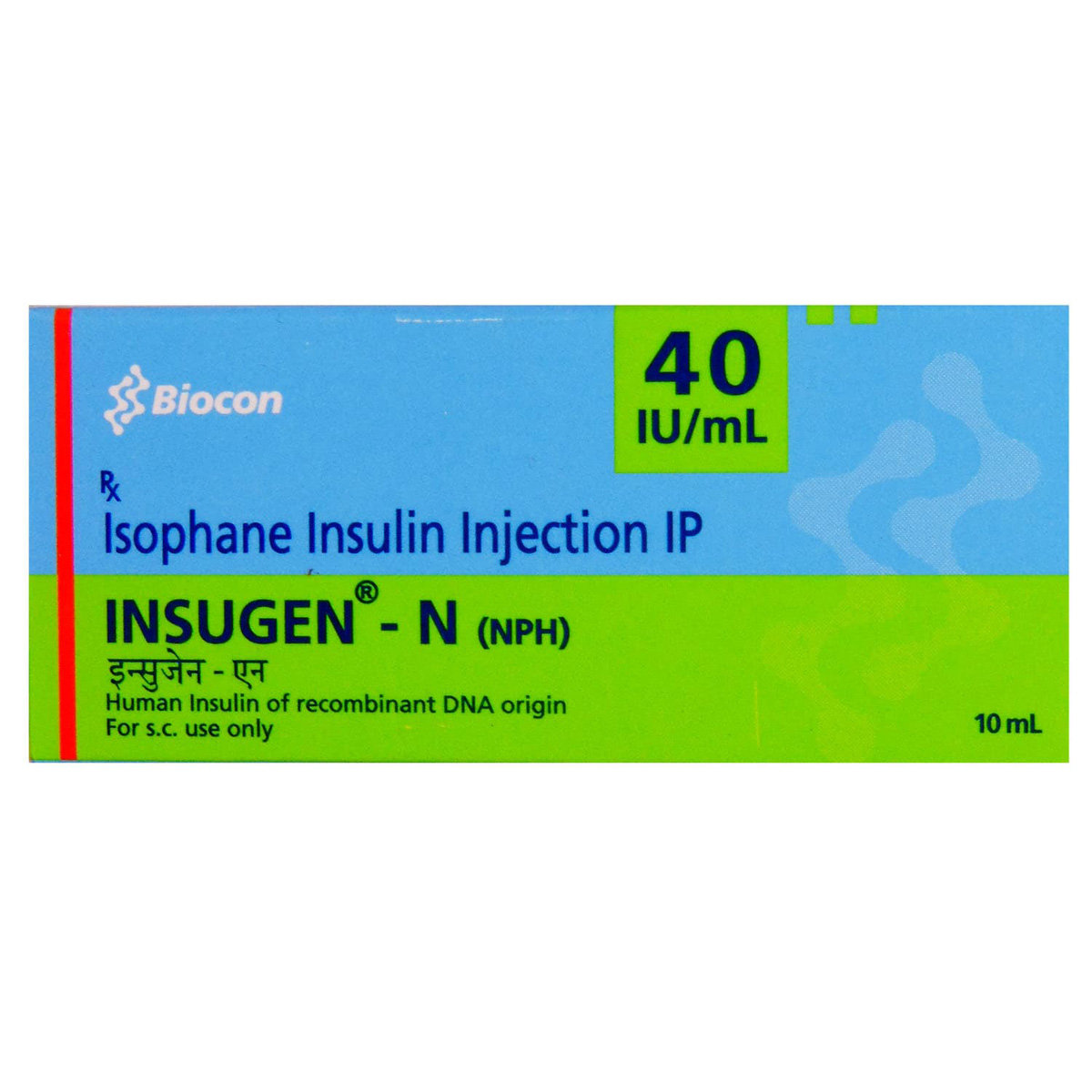Insulin Isophane+insulin (pork)
About Insulin Isophane+insulin (pork)
Insulin Isophane+insulin (pork) belongs to the class of ‘anti-diabetic drugs’, primarily used to treat type 1 and type 2 diabetes mellitus. Diabetes mellitus is a group of metabolic diseases that cause high blood sugar levels. In Diabetes Mellitus Type 1, the body does not make enough insulin to control blood sugar levels. In Diabetes Mellitus type 2, either the body stops producing enough insulin (the hormone which helps to decrease sugar levels in the blood), or there is resistance to the action of insulin. Symptoms include increased thirst, frequent urination, increased appetite, and blurred vision.
Insulin Isophane+insulin (pork) is a combination of two insulin products: Insulin (Pork) (a short-acting type of insulin) and Insulin isophane (intermediate-acting). Insulin (Pork) is obtained from pigs and is similar to human insulin. It works by helping the cells utilize the blood sugar (glucose) in the body to convert it into energy. Insulin isophane is an intermediate-acting insulin that lowers the blood glucose levels in diabetic patients by performing the action of insulin hormone.
Use Insulin Isophane+insulin (pork) as prescribed by your doctor. Some common side effects of Insulin Isophane+insulin (pork) include low blood sugar, weight gain, swelling of hands and feet, itching, mild skin rash, and thickening of the skin at the injection site (lipodystrophy). These side effects are not familiar to everyone and vary individually. If you notice any side effects that are not manageable, please consult your doctor.
Before starting Insulin Isophane+insulin (pork), let your doctor know if you have any medical history of heart, kidney or liver diseases, low blood sugar (hypoglycaemia), and low potassium levels in the blood (hypokalaemia). Do not take or stop this medicine if the doctor did not advise you to do so. It is recommended to avoid your alcohol intake while using Insulin Isophane+insulin (pork) to avoid low blood sugar levels further. Pregnant and breastfeeding women should consult their doctor before starting Insulin Isophane+insulin (pork).
Uses of Insulin Isophane+insulin (pork)
Medicinal Benefits
Insulin Isophane+insulin (pork) helps control blood sugar levels in type 1 and type 2 diabetes mellitus. It consists of Insulin (pork) and Insulin isophane. Insulin (pork) is obtained from pigs and is similar to human insulin. Human insulin is a hormone produced by the beta cells of the pancreas that converts blood glucose or sugars into energy. Insulin (pork) is short-acting insulin and is usually given in combination with other medium or long-acting insulin products. It works by helping the cells utilize the blood sugar (glucose) in the body to convert it into energy. Insulin isophane is an intermediate-acting insulin that lowers the blood glucose levels in diabetic patients by performing the action of insulin hormone. Insulin isophane begins to work within 2-4 hours after being injected, peaks between 4-12 hours, and keeps working for 12-18 hours. Insulin Isophane+insulin (pork) may be advised along with diet and exercise by your doctor to control blood sugar levels.
Directions for Use
Storage
Side Effects of Insulin Isophane+insulin (pork)
- Low blood sugar
- Weight gain
- Swelling of hands and feet
- Itching
- Mild skin rash
- Thickening of skin at the injection site (lipodystrophy)
Drug Warnings
Do not take or stop this medicine if the doctor did not advise you to do so. Insulin Isophane+insulin (pork) is for subcutaneous use only and should never be administered intravenously (IV) or in the veins. Brief your medical history to the doctor if you have any heart, kidney or liver diseases, low blood sugar (hypoglycaemia), and low potassium levels in the blood (hypokalaemia) before starting Insulin Isophane+insulin (pork). Do not share an injection pen, cartridge, or syringe with another person, even if the needle is changed. Do not inject Insulin Isophane+insulin (pork) daily at the same injection site since it may cause skin changes, such as lumps under the skin. Do not drive or operate machinery if you experience blurred vision, dizziness or drowsiness due to extremely low or high blood sugar. It is advised to avoid your alcohol intake while using Insulin Isophane+insulin (pork) to further avoid low blood sugar levels. Pregnant and breastfeeding women should consult their doctor before starting this medication. Insulin Isophane+insulin (pork) is recommended to be used in children only with doctor’s advice.
Drug Interactions
Drug-Drug Interaction: Insulin Isophane+insulin (pork) may interact with other anti-diabetic drugs (rosiglitazone, pramlintide acetate), anti-depressants (phenelzine, iproniazid, isocarboxazid, nialamide, imipramine, desipramine, tranylcypromine, moclobemide), blood pressure medicines (metoprolol, propranolol), Parkinson’s medicines (selegiline), (lithium, tryptophan), migraine drugs (sumatriptan), antibiotics (pentamidine, linezolid), pain killers (tramadol), anti-ulcer drugs (cimetidine, lansoprazole, omeprazole), antifungals (fluconazole), anti-stroke pills (ticlopidine), blood-thinners (warfarin, dipyridamole, and phenprocoumon), antimalarials (mefloquine), heart-related drugs (flecainide, propafenone), and medicines that decrease blood levels of potassium or magnesium.
Drug-Food Interaction: Avoid alcohol intake since it affects blood sugar levels. Avoid fatty foods and include healthy carbohydrates in your diet.
Drug-Disease Interaction: Tell your doctor before taking Insulin Isophane+insulin (pork) if you have a medical history of allergic reactions to medicines, heart, kidney or liver diseases, hypoglycaemia, and hypokalaemia.
Drug-Drug Interactions Checker List:
Safety Advice

Alcohol
unsafeIt is advised to avoid alcohol intake since it may worsen the side effects and increase the risk of developing low blood sugar levels.

Pregnancy
safe if prescribedPregnancy can cause diabetes or worsen your diabetic condition. Please consult your doctor before starting Insulin Isophane+insulin (pork) if you are pregnant or planning to conceive.

Breast Feeding
safe if prescribedInsulin Isophane+insulin (pork) is recommended for use in breastfeeding only with medical advice.

Driving
cautionYour driving may be affected if your blood sugar levels are too high or too low. Do not drive or operate machinery if you also experience blurred vision, dizziness or drowsiness due to extremely low or high blood sugar.

Liver
cautionLet your doctor know if you have any history of liver diseases or hepatic impairment when prescribed Insulin Isophane+insulin (pork). Your dose may be adjusted in case of liver diseases.

Kidney
cautionLet your doctor know if you have any history of kidney diseases when you are prescribed Insulin Isophane+insulin (pork). Dose adjustments may be required in case of renal dysfunction.

Children
cautionInsulin Isophane+insulin (pork) should be used in children only when prescribed by the doctor and under medical supervision. Your doctor may provide further information on the dosage for your child.
Habit Forming
Diet & Lifestyle Advise
- Include Vitamin B1-rich foods like beans, legumes, dairy products (such as yoghurt), eggs, meat, poultry, fish, nuts, seeds, thiamine-enriched breakfast cereals, and whole grains in your diet
- While travelling across more than two time zones, you should talk to your doctor about your insulin schedule adjustments.
- Maintain a fibre-rich diet and include healthy carbohydrates from fruits, vegetables and whole grains to maintain your blood glucose levels.
- Eat at regular intervals.
- Keep a check on your weight and exercise regularly to keep your heart healthy.
- Your doctor also guides you on noticing and managing the early symptoms of high/low blood sugar levels.
- Gastrointestinal side effects can be managed with simple modifications in your lifestyle. These include cutting down on sugars and fatty foods, and avoiding carbonated drinks and foods that cause gas.
Special Advise
- It is advised to monitor your blood sugar levels regularly.
- Regular monitoring of kidney functioning is advised while using Insulin Isophane+insulin (pork).
- If you experience severe hypoglycaemia, your doctor may advise a glucagon injection kit. Let your family and friends know how to give you this injection in cases of emergency.
- Regular screening of your potassium levels is recommended to rule out the possibility of hypokalaemia.
Patients Concern
Disease/Condition Glossary
Diabetes mellitus is a metabolic disease that causes high blood sugar levels. Type 1 diabetes (juvenile diabetes) is an autoimmune disease in which the immune system attacks and destroys its own cells in the pancreas, thereby producing no insulin. It often occurs in childhood. Type 2 diabetes (adult-onset diabetes) occurs when the insulin (a hormone produced by the beta cells of the pancreas) is resistant in breaking the glucose to produce energy (insulin resistance) or the pancreas (an organ behind the stomach) produce little or no insulin at all. Symptoms include frequent urination, increased thirst, hunger, and blurred vision. The treatment includes oral glucose-lowering medicines and insulin shots.
FAQs
Insulin Isophane+insulin (pork) contains short-acting insulin (pork) and intermediate-acting insulin isophane. These insulin products work similar to human insulin and help the body cells utilize the blood sugar to convert it into energy. Thus, Insulin Isophane+insulin (pork) helps in lowering the blood sugar levels in diabetic patients.
Insulin Isophane+insulin (pork) may cause low blood sugar levels (hypoglycaemia) and can make you hungry, dizzy, irritable, confused, anxious, or shaky. Hence, it is advised to take Insulin Isophane+insulin (pork) with a meal. To immediately treat hypoglycaemia, it is advised to eat or drink fast-acting sugar sources like fruit juices, hard candy, raisins, or non-diet soda.
Insulin Isophane+insulin (pork) should be used with caution in heart, kidney or liver diseases, low blood sugar (hypoglycaemia), and low potassium levels in the blood (hypokalaemia). Inform your doctor if you have any other medical concerns before starting Insulin Isophane+insulin (pork).
Take the missed dose as soon as possible. However, if it is time for the next dose, skip the missed dose and go back to your regular dosing schedule. Do not double the dose.
Insulin Isophane+insulin (pork) is to be injected subcutaneously (under the skin). The best areas to give Insulin Isophane+insulin (pork) are your upper thigh, stomach, upper arm, or buttocks.
Store the unused Insulin Isophane+insulin (pork) in a refrigerator at 2°C to 8°C. After its initial use, store Insulin Isophane+insulin (pork) at room temperature of 15°C to 30°C or in refrigerator and use within 28 days. Do not freeze Insulin Isophane+insulin (pork). Do not use the Insulin Isophane+insulin (pork) if it is frozen and discard it.


